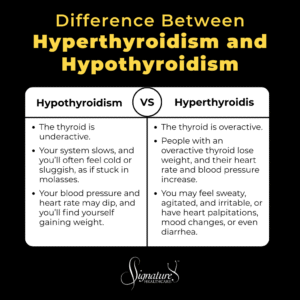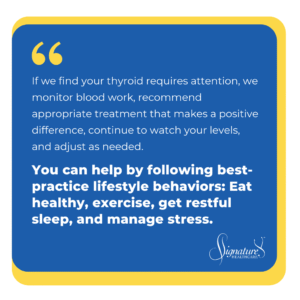Hypothyroidism vs. Hyperthyroidism: How Are They Different?
We all experience a fatiguing day every so often. Yet chronic fatigue, coupled with fairly rapid weight gain, may signal a thyroid condition.
And you may be surprised to learn that ongoing jitters, accompanied by weight loss, can point to the thyroid as well.
Unquestionably, thyroid issues can cause a broad range of opposing symptoms. Let’s look at the difference between hyperthyroidism and hypothyroidism:

Hypothyroidism
In cases of hypothyroidism — the most common thyroid disorder — the thyroid is underactive. Your system slows, and you’ll often feel cold or sluggish, as if stuck in molasses. Your blood pressure and heart rate may dip, and you’ll find yourself gaining weight.
Some people with hypothyroidism also experience depressive symptoms, dry skin, delayed reflexes, and/or constipation.
Hyperthyroidism
In hyperthyroidism, the thyroid is overactive. People with an overactive thyroid lose weight, and their heart rate and blood pressure increase.
You may feel sweaty, agitated, and irritable, or have heart palpitations, mood changes, or even diarrhea.
Hypothyroidism vs. Hyperthyroidism: Detecting Thyroid Problems
When a patient reports a lack of energy and chronic tiredness, we screen for a spectrum of possible causes. Hypothyroidism is often caused by an autoimmune disease — your body attacks the thyroid, provoking a malfunction.
Hypothyroidism is more common in females and in middle age or later years. However, it can also occur in younger individuals and can occur following an illness.
Here’s the difference between hyperthyroidism and hypothyroidism: While not rare, a hyperactive thyroid is much less common than a hypoactive one. But hyperthyroidism can also be autoimmune: The most common type of hyperthyroid condition is when your body produces an antibody that mimics the thyroid hormone and tells your thyroid to produce too much, a condition known as Graves’ disease.
A constellation of symptoms alerts us to a thyroid issue. If a patient has a single symptom (say, sudden weight gain), the odds of the thyroid having caused it are pretty low (although easily verified by lab work). But if the person is constantly lethargic, has swift weight gain or loss, an elevated heart rate, or is always sweaty, jittery, or nervous, the thyroid may be the culprit.
When a thyroid malfunctions, the brain instructs it to increase or decrease its function by releasing or restricting thyroid stimulating hormone (TSH), which tells the thyroid gland to produce more or less T3 and T4. Abnormal TSH, T3, and T4 levels indicate thyroid problems.
Simple blood work helps us detect a thyroid disorder quickly. If blood work shows TSH is fairly high, the thyroid is underperforming; if it’s low, the thyroid’s overperforming. High T3 or T4 may indicate hyperthyroidism; low T3 or T4 may indicate hypothyroidism, an underactive thyroid.
Hypothyroidism vs. Hyperthyroidism: Treating Thyroid Issues
Hyperactive Thyroid
On average, patients with hyperactive thyroids feel sicker, present symptoms more quickly, and are treated more urgently than those who are hypoactive.
Treatment depends on whether the patient has Graves’ disease, overactive thyroid nodules, or a separate condition.
If lab work says the patient’s TSH is hard to detect, and T4 levels are very high, we move quickly to treat. Typically, we prescribe medication that suppresses the overactive thyroid glands.
In severe cases, radiation may be used to inactivate the thyroid; in extreme circumstances, surgical removal may be the answer.
Hypoactive Thyroid
In rare, long-term cases of extreme hypothyroidism (vs. hyperthyroidism), the thyroid isn’t functioning at all, and the patient is very sick.
But for most patients, hypothyroidism is a slow burn. Individuals may be mildly affected for a long time but convince themselves they’re just naturally tired or can’t lose weight.
To treat hypothyroidism, we augment thyroid functioning with medication that mimics the hormone the body isn’t producing enough of.
In most cases, both hyperthyroidism and hypothyroidism are easily diagnosed and quite treatable. Treatment returns TSH, T4, and T3 levels to normal. We prescribe you a long-range course of thyroid medication and monitor your thyroid for occasional mild fluctuations in your condition.
We Love Keeping You Healthy
At Signature Healthcare, we understand the differences between hyperthyroidism and hypothyroidism, and we appreciate making a diagnosis that gets you feeling comfortable again.
If we find your thyroid requires attention, we monitor blood work, recommend appropriate treatment that makes a positive difference, continue to watch your levels, and adjust as needed. You can help by following best-practice lifestyle behaviors: Eat healthy, exercise, get restful sleep, and manage stress.
Be proactive about thyroid health by having your annual physical and conversation with your Signature Healthcare physician. Let’s get you scheduled.


Michael Warren Smith, MD
Dr. Michael Smith, MD, a dedicated internal medicine specialist, has been serving Charlotte families with distinction for over 19 years. A Wake Forest University alumnus and a devoted family man, Dr. Smith balances his professional life with a passion for golf, beach travels, Peloton rides, and cheering for ACC teams, alongside his wife, Dr. Erin Smith, their two children, and Bogey, their Golden Retriever.

